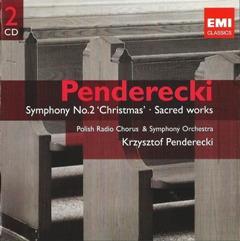Penderecki : Symphony No.2 'Christmas' - Sacred works (2008)
Penderecki : Symphony No.2 'Christmas' - Sacred works (2008)

CD 1: 1.Symphony No.2 "Christmas Symphony" 2.Te Deum for 4 soloists, 2 choruses & orchestra CD 2: 3.Lacrimosa for soprano, chorus & orchestra Magnificat for bass, 7 men's voices, boys' chorus, chorus & orchestra 4. Magnificat-Fuga-Quia Respexit-Misericordia 5. Fecit Potentiam 6. Passacaglia-Magnificat 7. Sicut Locutus Est – Gloria 8.Kanon Jadwiga Gadulanka - soprano Ewa Podles - mezzo-soprano Wiesław Ochman - tenor Andrzej Hiolski - baritone Kraków Philharmonic Chorus Polish Radio Chorus of Kraków Polish Radio Symphony Orchestra of Kraków Polish Radio National Symphony Orchestra Polish Radio Symphony Orchestra Krzysztof Penderecki – conductor
This two-disc EMI set of the music of Krzysztof Penderecki features five works. The Kanon for strings and tape is from the Polish post-modernist's early enfant terrible period while the other four -- the choral-orchestral Te Deum, Lacrimosa Magnificat, and the purely orchestral "Christmas" Symphony -- are from his later established master period. The dramatic change of style between the two periods will likely impact listeners' reactions to the performances with the earlier work drawing in listeners attuned to the composer's epoch-making and nerve-wracking Threnody for the Victims of Hiroshima and the later works appealing to listeners who prefer more traditional modes of musical discourse. In every case, however, the music is ideally represented in performances led by the composer, and in his hands, the Kanon's screeching sheets of sound and the symphony's stately progress of harmonies are both equally impressive. Played by three different Polish radio orchestras and sung by two different Polish choirs and including contributions by some of Poland's best singers -- clarion soprano Ewa Podles is especially effective in the Te Deum -- no one who admires Penderecki's music should let this set pass by unheard. EMI's late stereo sound is a bit gray and boxy, but still clear enough to let the music through. --- James Leonard, Rovi
Krzysztof Penderecki is a national figure in Poland. He is recognised almost everywhere he goes; yet most Poles have never heard a note of his music. He commands national respect because of the acclaim Penderecki has won abroad. Until Gorecki's recent successes, Penderecki was Poland's most successful modern musical export. From his early experiments with 'texture music' (noise to the uninitiated) in the early 1960 he moved to a more sombre neo-romantic style in the 70s and 80s which owed much to the 19th century German master, Bruckner. Like Bruckner, Penderecki has explored and expressed his Catholic faith through his music, often in works of an explicitly religious nature. He found writing the Second Symphony difficult until Christmas 1979 when he was able to complete the work by quoting the carol "Silent Night". Penderecki publicly stated the significance which the eve of Christ's birth has had on his faith and music and particularly this piece. The work is, however, dark and sombre, very gloomy. The carol "Silent Night" is quoted three times, but only briefly, providing a ray of hope in a dark and dismal picture. I suspect Penderecki is making a theological point - it was to a dark and sinful world that Christ came, to be born in the filth and squalor of Bethlehem. It is to a dark and hostile world that Christ still comes today, and Penderecki reflects a suffering world awaiting the coming of the Redeemer. --- John Irvine, crossrhythms.co.uk
download (mp3 @320 kbs):
yandex 4shared mega mediafire zalivalka cloudmailru uplea








